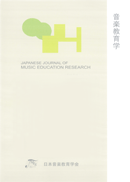Volume 42, Issue 2
Displaying 1-17 of 17 articles from this issue
- |<
- <
- 1
- >
- >|
-
2012Volume 42Issue 2 Pages 1-12
Published: 2012
Released on J-STAGE: March 31, 2017
Download PDF (611K)
-
2012Volume 42Issue 2 Pages 13-14
Published: 2012
Released on J-STAGE: March 31, 2017
Download PDF (117K)
-
2012Volume 42Issue 2 Pages 15-21
Published: 2012
Released on J-STAGE: March 31, 2017
Download PDF (403K)
-
2012Volume 42Issue 2 Pages 22-28
Published: 2012
Released on J-STAGE: March 31, 2017
Download PDF (387K)
-
2012Volume 42Issue 2 Pages 29-34
Published: 2012
Released on J-STAGE: March 31, 2017
Download PDF (354K)
-
2012Volume 42Issue 2 Pages 35-43
Published: 2012
Released on J-STAGE: March 31, 2017
Download PDF (469K)
-
2012Volume 42Issue 2 Pages 44-51
Published: 2012
Released on J-STAGE: March 31, 2017
Download PDF (466K)
-
2012Volume 42Issue 2 Pages 52-56
Published: 2012
Released on J-STAGE: March 31, 2017
Download PDF (306K)
-
2012Volume 42Issue 2 Pages 57-61
Published: 2012
Released on J-STAGE: March 31, 2017
Download PDF (304K)
-
2012Volume 42Issue 2 Pages 62-66
Published: 2012
Released on J-STAGE: March 31, 2017
Download PDF (260K)
-
2012Volume 42Issue 2 Pages 67-71
Published: 2012
Released on J-STAGE: March 31, 2017
Download PDF (266K)
-
2012Volume 42Issue 2 Pages 72-76
Published: 2012
Released on J-STAGE: March 31, 2017
Download PDF (292K)
-
2012Volume 42Issue 2 Pages 77-81
Published: 2012
Released on J-STAGE: March 31, 2017
Download PDF (279K)
-
2012Volume 42Issue 2 Pages 82-86
Published: 2012
Released on J-STAGE: March 31, 2017
Download PDF (299K)
-
2012Volume 42Issue 2 Pages 87-91
Published: 2012
Released on J-STAGE: March 31, 2017
Download PDF (298K)
-
2012Volume 42Issue 2 Pages 92-96
Published: 2012
Released on J-STAGE: March 31, 2017
Download PDF (281K)
-
2012Volume 42Issue 2 Pages 97-101
Published: 2012
Released on J-STAGE: March 31, 2017
Download PDF (267K)
- |<
- <
- 1
- >
- >|
